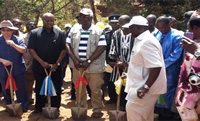The construction of Bhanka Soka Hydro Power Plant in Sierra Leone was completed in 2016 and is located along the Bankasoka river, near Port Loko. The 2 MW plant is currently operational and was funded by the Government of China while UNIDO funded the feasibility study. The 7.7 million euro plant is categorized as a small hydro plant.
Reported in August 2014
Construction of $32 million Bhanka Soko Hydro Power Plant Begins in Sierra Leone
 The construction of a United Nations-supported hydropower plant has commenced in north-western Sierra Leone in an effort to bring electricity to the local community, which is expected to benefit from improved irrigation, water, and sanitation services and increased business opportunities.
The construction of a United Nations-supported hydropower plant has commenced in north-western Sierra Leone in an effort to bring electricity to the local community, which is expected to benefit from improved irrigation, water, and sanitation services and increased business opportunities.
The three-megawatt capacity plant on the Bankasoka River, near the town of Port Loko, is funded by the Government of China and the UN Industrial Development Organization (UNIDO), according to the UN agency, which promotes industrial development for poverty reduction, inclusive globalization, and environmental sustainability.
“Small and micro hydro plants in rural areas of Sierra Leone will help improve access to modern energy services, and boost market activities and irrigation,” said UNIDO’s Director-General, Kandeh K. Yumkella, who accompanied Sierra Leone’s President, Ernest Bai Koroma, during the laying of the plant’s foundation stone.
Mr. Yumkella said UNIDO is working on a feasibility study for a 10-megawatt hydropower project in Sierra Leone to be funded by the Global Environment Facility (GEF) for $32 million. The GEF is an independent financial organization that provides grants to developing countries and countries with economies in transition for projects related to issues such as biodiversity, climate change, and land degradation.
The head of UNIDO noted that increasing access to modern energy services was a prerequisite for creating social and economic opportunities that should improve the lives of the world’s poorest.
Progress is desperately needed, he said, as one person in five worldwide still lacks access to electricity. Nearly three billion people – more than 40 percent of the world – rely on wood, coal, charcoal or animal waste for cooking and heating.

